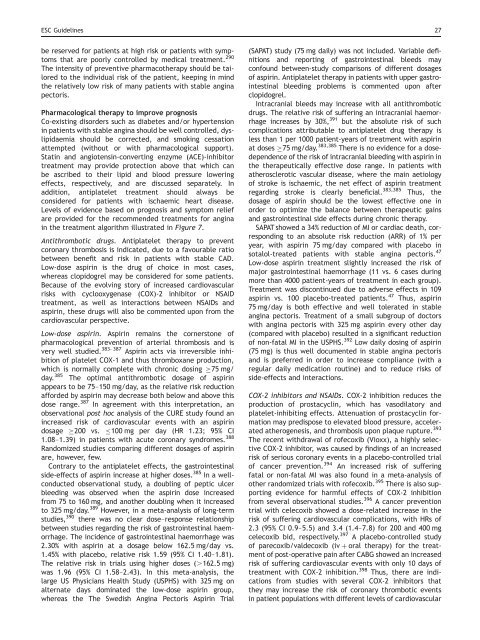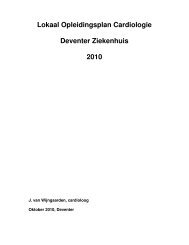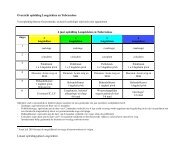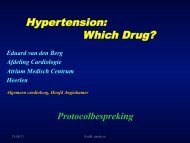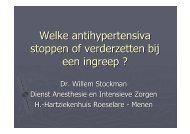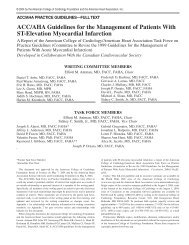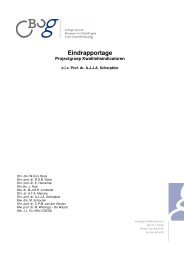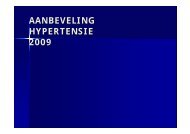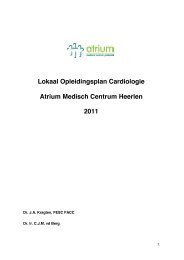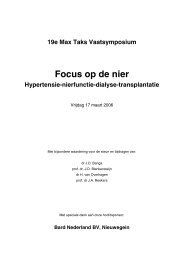Guidelines on the Management of Stable Angina Pectoris ... - Cardio
Guidelines on the Management of Stable Angina Pectoris ... - Cardio
Guidelines on the Management of Stable Angina Pectoris ... - Cardio
You also want an ePaper? Increase the reach of your titles
YUMPU automatically turns print PDFs into web optimized ePapers that Google loves.
ESC <str<strong>on</strong>g>Guidelines</str<strong>on</strong>g> 27be reserved for patients at high risk or patients with symptomsthat are poorly c<strong>on</strong>trolled by medical treatment. 290The intensity <strong>of</strong> preventive pharmaco<strong>the</strong>rapy should be tailoredto <strong>the</strong> individual risk <strong>of</strong> <strong>the</strong> patient, keeping in mind<strong>the</strong> relatively low risk <strong>of</strong> many patients with stable anginapectoris.Pharmacological <strong>the</strong>rapy to improve prognosisCo-existing disorders such as diabetes and/or hypertensi<strong>on</strong>in patients with stable angina should be well c<strong>on</strong>trolled, dyslipidaemiashould be corrected, and smoking cessati<strong>on</strong>attempted (without or with pharmacological support).Statin and angiotensin-c<strong>on</strong>verting enzyme (ACE)-inhibitortreatment may provide protecti<strong>on</strong> above that which canbe ascribed to <strong>the</strong>ir lipid and blood pressure loweringeffects, respectively, and are discussed separately. Inadditi<strong>on</strong>, antiplatelet treatment should always bec<strong>on</strong>sidered for patients with ischaemic heart disease.Levels <strong>of</strong> evidence based <strong>on</strong> prognosis and symptom reliefare provided for <strong>the</strong> recommended treatments for anginain <strong>the</strong> treatment algorithm illustrated in Figure 7.Antithrombotic drugs. Antiplatelet <strong>the</strong>rapy to preventcor<strong>on</strong>ary thrombosis is indicated, due to a favourable ratiobetween benefit and risk in patients with stable CAD.Low-dose aspirin is <strong>the</strong> drug <strong>of</strong> choice in most cases,whereas clopidogrel may be c<strong>on</strong>sidered for some patients.Because <strong>of</strong> <strong>the</strong> evolving story <strong>of</strong> increased cardiovascularrisks with cyclooxygenase (COX)-2 inhibitor or NSAIDtreatment, as well as interacti<strong>on</strong>s between NSAIDs andaspirin, <strong>the</strong>se drugs will also be commented up<strong>on</strong> from <strong>the</strong>cardiovascular perspective.Low-dose aspirin. Aspirin remains <strong>the</strong> cornerst<strong>on</strong>e <strong>of</strong>pharmacological preventi<strong>on</strong> <strong>of</strong> arterial thrombosis and isvery well studied. 383–387 Aspirin acts via irreversible inhibiti<strong>on</strong><strong>of</strong> platelet COX-1 and thus thromboxane producti<strong>on</strong>,which is normally complete with chr<strong>on</strong>ic dosing 75 mg/day. 385 The optimal antithrombotic dosage <strong>of</strong> aspirinappears to be 75–150 mg/day, as <strong>the</strong> relative risk reducti<strong>on</strong>afforded by aspirin may decrease both below and above thisdose range. 387 In agreement with this interpretati<strong>on</strong>, anobservati<strong>on</strong>al post hoc analysis <strong>of</strong> <strong>the</strong> CURE study found anincreased risk <strong>of</strong> cardiovascular events with an aspirindosage 200 vs. 100 mg per day (HR 1.23; 95% CI1.08–1.39) in patients with acute cor<strong>on</strong>ary syndromes. 388Randomized studies comparing different dosages <strong>of</strong> aspirinare, however, few.C<strong>on</strong>trary to <strong>the</strong> antiplatelet effects, <strong>the</strong> gastrointestinalside-effects <strong>of</strong> aspirin increase at higher doses. 385 In a wellc<strong>on</strong>ductedobservati<strong>on</strong>al study, a doubling <strong>of</strong> peptic ulcerbleeding was observed when <strong>the</strong> aspirin dose increasedfrom 75 to 160 mg, and ano<strong>the</strong>r doubling when it increasedto 325 mg/day. 389 However, in a meta-analysis <strong>of</strong> l<strong>on</strong>g-termstudies, 390 <strong>the</strong>re was no clear dose–resp<strong>on</strong>se relati<strong>on</strong>shipbetween studies regarding <strong>the</strong> risk <strong>of</strong> gastrointestinal haemorrhage.The incidence <strong>of</strong> gastrointestinal haemorrhage was2.30% with aspirin at a dosage below 162.5 mg/day vs.1.45% with placebo, relative risk 1.59 (95% CI 1.40–1.81).The relative risk in trials using higher doses (.162.5 mg)was 1.96 (95% CI 1.58–2.43). In this meta-analysis, <strong>the</strong>large US Physicians Health Study (USPHS) with 325 mg <strong>on</strong>alternate days dominated <strong>the</strong> low-dose aspirin group,whereas <strong>the</strong> The Swedish <strong>Angina</strong> <strong>Pectoris</strong> Aspirin Trial(SAPAT) study (75 mg daily) was not included. Variable definiti<strong>on</strong>sand reporting <strong>of</strong> gastrointestinal bleeds mayc<strong>on</strong>found between-study comparis<strong>on</strong>s <strong>of</strong> different dosages<strong>of</strong> aspirin. Antiplatelet <strong>the</strong>rapy in patients with upper gastrointestinalbleeding problems is commented up<strong>on</strong> afterclopidogrel.Intracranial bleeds may increase with all antithromboticdrugs. The relative risk <strong>of</strong> suffering an intracranial haemorrhageincreases by 30%, 391 but <strong>the</strong> absolute risk <strong>of</strong> suchcomplicati<strong>on</strong>s attributable to antiplatelet drug <strong>the</strong>rapy isless than 1 per 1000 patient-years <strong>of</strong> treatment with aspirinat doses 75 mg/day. 383,385 There is no evidence for a dosedependence<strong>of</strong> <strong>the</strong> risk <strong>of</strong> intracranial bleeding with aspirin in<strong>the</strong> <strong>the</strong>rapeutically effective dose range. In patients witha<strong>the</strong>rosclerotic vascular disease, where <strong>the</strong> main aetiology<strong>of</strong> stroke is ischaemic, <strong>the</strong> net effect <strong>of</strong> aspirin treatmentregarding stroke is clearly beneficial. 383,385 Thus, <strong>the</strong>dosage <strong>of</strong> aspirin should be <strong>the</strong> lowest effective <strong>on</strong>e inorder to optimize <strong>the</strong> balance between <strong>the</strong>rapeutic gainsand gastrointestinal side effects during chr<strong>on</strong>ic <strong>the</strong>rapy.SAPAT showed a 34% reducti<strong>on</strong> <strong>of</strong> MI or cardiac death, corresp<strong>on</strong>dingto an absolute risk reducti<strong>on</strong> (ARR) <strong>of</strong> 1% peryear, with aspirin 75 mg/day compared with placebo insotalol-treated patients with stable angina pectoris. 47Low-dose aspirin treatment slightly increased <strong>the</strong> risk <strong>of</strong>major gastrointestinal haemorrhage (11 vs. 6 cases duringmore than 4000 patient-years <strong>of</strong> treatment in each group).Treatment was disc<strong>on</strong>tinued due to adverse effects in 109aspirin vs. 100 placebo-treated patients. 47 Thus, aspirin75 mg/day is both effective and well tolerated in stableangina pectoris. Treatment <strong>of</strong> a small subgroup <strong>of</strong> doctorswith angina pectoris with 325 mg aspirin every o<strong>the</strong>r day(compared with placebo) resulted in a significant reducti<strong>on</strong><strong>of</strong> n<strong>on</strong>-fatal MI in <strong>the</strong> USPHS. 392 Low daily dosing <strong>of</strong> aspirin(75 mg) is thus well documented in stable angina pectorisand is preferred in order to increase compliance (with aregular daily medicati<strong>on</strong> routine) and to reduce risks <strong>of</strong>side-effects and interacti<strong>on</strong>s.COX-2 inhibitors and NSAIDs. COX-2 inhibiti<strong>on</strong> reduces <strong>the</strong>producti<strong>on</strong> <strong>of</strong> prostacyclin, which has vasodilatory andplatelet-inhibiting effects. Attenuati<strong>on</strong> <strong>of</strong> prostacyclin formati<strong>on</strong>may predispose to elevated blood pressure, accelerateda<strong>the</strong>rogenesis, and thrombosis up<strong>on</strong> plaque rupture. 393The recent withdrawal <strong>of</strong> r<strong>of</strong>ecoxib (Vioxx), a highly selectiveCOX-2 inhibitor, was caused by findings <strong>of</strong> an increasedrisk <strong>of</strong> serious cor<strong>on</strong>ary events in a placebo-c<strong>on</strong>trolled trial<strong>of</strong> cancer preventi<strong>on</strong>. 394 An increased risk <strong>of</strong> sufferingfatal or n<strong>on</strong>-fatal MI was also found in a meta-analysis <strong>of</strong>o<strong>the</strong>r randomized trials with r<strong>of</strong>ecoxib. 395 There is also supportingevidence for harmful effects <strong>of</strong> COX-2 inhibiti<strong>on</strong>from several observati<strong>on</strong>al studies. 396 A cancer preventi<strong>on</strong>trial with celecoxib showed a dose-related increase in <strong>the</strong>risk <strong>of</strong> suffering cardiovascular complicati<strong>on</strong>s, with HRs <strong>of</strong>2.3 (95% CI 0.9–5.5) and 3.4 (1.4–7.8) for 200 and 400 mgcelecoxib bid, respectively. 397 A placebo-c<strong>on</strong>trolled study<strong>of</strong> parecoxib/valdecoxib (iv þ oral <strong>the</strong>rapy) for <strong>the</strong> treatment<strong>of</strong> post-operative pain after CABG showed an increasedrisk <strong>of</strong> suffering cardiovascular events with <strong>on</strong>ly 10 days <strong>of</strong>treatment with COX-2 inhibiti<strong>on</strong>. 398 Thus, <strong>the</strong>re are indicati<strong>on</strong>sfrom studies with several COX-2 inhibitors that<strong>the</strong>y may increase <strong>the</strong> risk <strong>of</strong> cor<strong>on</strong>ary thrombotic eventsin patient populati<strong>on</strong>s with different levels <strong>of</strong> cardiovascular


